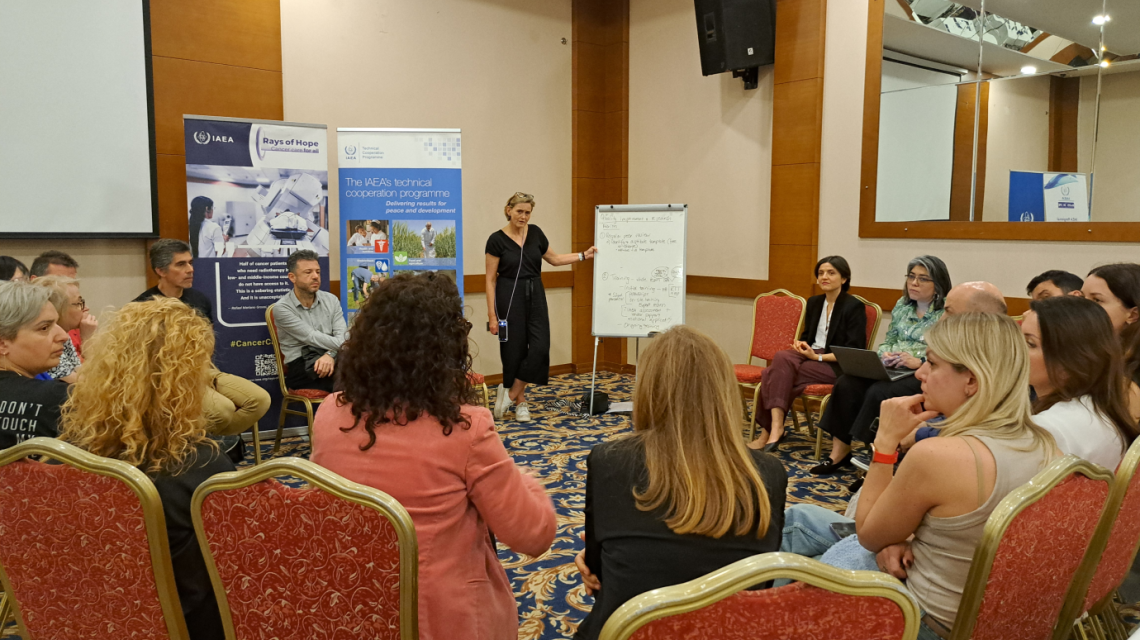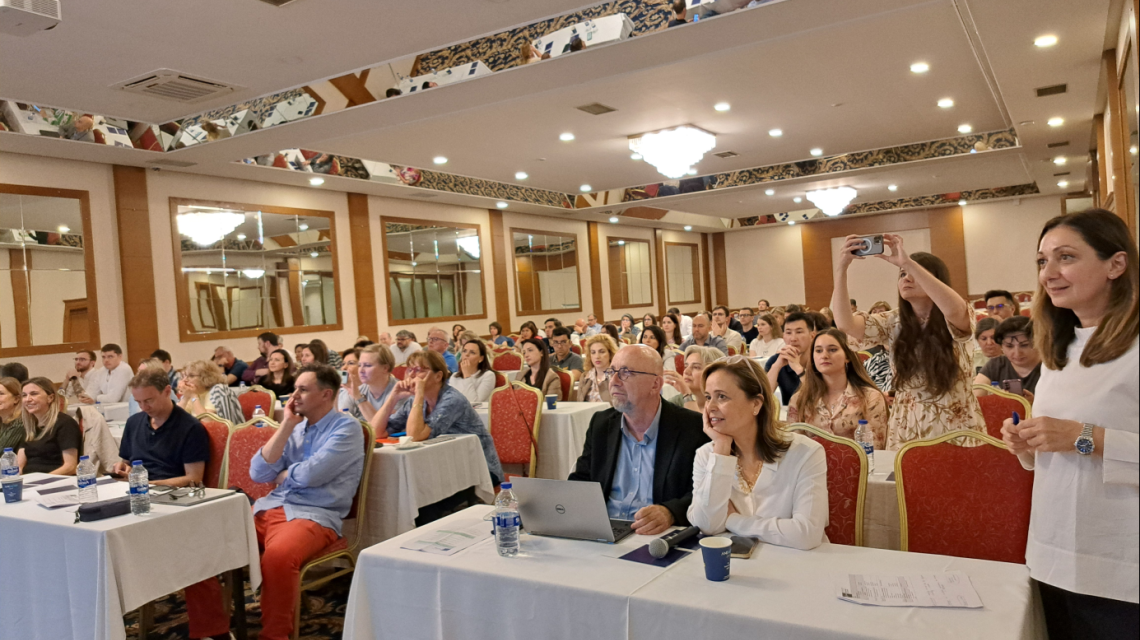Ege University Faculty of Medicine, one of the first Rays of Hope Anchor Centres officially designated by the IAEA to strengthen regional expertise in cancer care, held a landmark first workshop in April bringing together close to 100 radiotherapy professionals to exchange best practices and knowledge on paediatric radiotherapy. The result was a firm commitment to collaborating on improved cancer care for children and a concrete roadmap for expanding access to paediatric radiotherapy services.
Medical professionals from around Europe and Central Asia - including radiation oncologists, medical physicists and radiotherapy technologists - joined international experts from the IAEA, the Paediatric Radiation Oncology Society, the Policlinico Agostino Gemelli, St. Jude Children's Research Hospital, the SIOP Europe Radiation Oncology Working Group, and the World Health Organization (WHO) to exchange perspectives and build the connections needed to expand access to radiotherapy for children.
The WHO has estimated that approximately 400 000 children and adolescents are diagnosed with cancer every year. Though fewer than 50 per cent will require access to radiotherapy, for those who do it is important that the quality of the treatment is high, as it has an impact on long term outcomes, side-effects and survival.
"Cancer is a rare disease among children," explained Professor Yavuz Anacak from Ege University. "Because of the variety in cancer types and clinical presentations, it requires a multidisciplinary effort involving radiation oncologists, medical physicists and radiotherapy technologists," he added.
The relatively limited number of cases can make it more challenging for medical professionals to build up the needed clinical experience. "The knowledge gained during this workshop was highly significant, precisely because Estonia deals with a relatively small number of paediatric patients," agreed Markus Vardja, a medical physicist from Estonia. "I feel motivated to implement new strategies and best practices in my work back in Tartu, knowing that it will enhance collaboration within our field and foster stronger ties between different paediatric radiotherapy centres," he added.

During the workshop, different experts from across the field of oncology exchanged views on how to improve access to radiotherapy for children and adolescents diagnosed with cancer. (Photo: M. Yamamoto / IAEA)
"We chose to focus this first workshop on strategic discussions on childhood cancer in particular because of existing common challenges in paediatric radiotherapy," explained Elena Fidarova, IAEA Division of Applied Radiation Biology and Radiotherapy. The paediatric radiation oncology community is very small, with about 70 per cent of participating countries having only between one and five radiation oncologists treating children with cancer. "Regional networks are essential, as radiotherapy professionals can really benefit from each other's perspectives and experiences," she added.
Participants held focused discussions on how to successfully integrate radiotherapy into comprehensive treatment plans; explored how radiation oncology services can be optimized at the national level; discussed priorities and needs in terms of education, research and training; and debated which actions were needed to improve the quality of clinical care for children and adolescents. The workshop also featured educational refresher sessions on various aspects of radiotherapy for childhood cancer care.
The benefit of sharing experiences was highlighted by more than one participant attending the workshop: "The Regional Workshop was invaluable to understand where Bulgarian paediatric radiotherapy stands compared to other countries, what problems are shared and to find a way to optimize and improve our protocols, practice, and corresponding treatment results," said Elitsa Encheva, a radiation oncologist from Bulgaria. "It was an opportunity to agree on standards for better and wider educational and training programmes and to improve standards of paediatric radiotherapy across all countries," added radiotherapy technologist Kateřina Poláchová from the Czech Republic.

The room was full for the first regional workshop ever held by a Rays of Hope Anchor Centre on the highly specialised subject of paediatric radiotherapy. (Photo: M. Yamamoto / IAEA)
Also actively involved in the organization of the workshop was the WHO, who presented the progress achieved so far through its Global Initiative for Childhood Cancer (GICC) - an initiative launched in 2018 to prioritize childhood cancer at global, regional and national levels. Rays of Hope and the GICC are aligned in their goal of providing quality cancer care to children with cancer and the two organizations collaborate closely to this effect: "This workshop clearly showed that even in times of crises and emergencies, UN agencies remain supportive of international collaboration and ensure professional cooperation between specialists for a peaceful and prosperous future for mankind by defeating cancer in children. We need more events like this," said Vitaly Smelov, Medical Officer at the World Health Organization.
"We are delighted with the success of this first Rays of Hope Anchor Centre workshop which marked a milestone on so many levels," said Eve-Külli Kala, Director of the IAEA Division for Europe in the Department of Technical Cooperation. "It was a first for the region of Europe and Central Asia, a first for the Rays of Hope initiative, but most importantly, a major step on the way towards improving access to radiotherapy for children and adolescents living with cancer," she added.
What is Rays of Hope?
Rays of Hope is an initiative launched by the IAEA in February 2022 whose goal is to reduce the gap in access to high quality cancer care around the globe. Central to this flagship initiative are Anchor Centres: cancer institutes with a demonstrated record of working with the IAEA; deep technical expertise; long term commitment; and robust governance and medical infrastructure, among other criteria. These centres provide targeted support to neighbouring countries in key areas such as research, education, training, innovation and quality assurance. In creating the opportunities for regional, subregional and interregional advancement within cancer care, Anchor Centres help to ensure a lasting impact.






